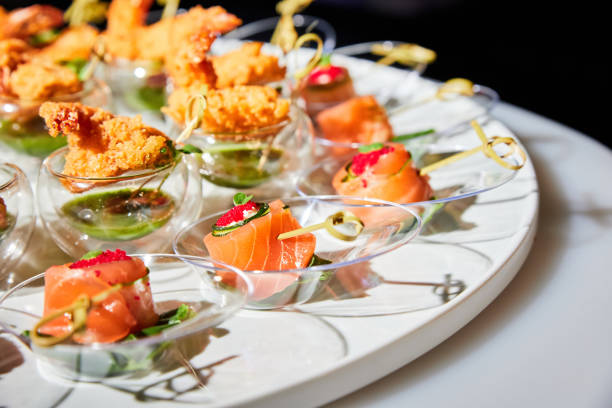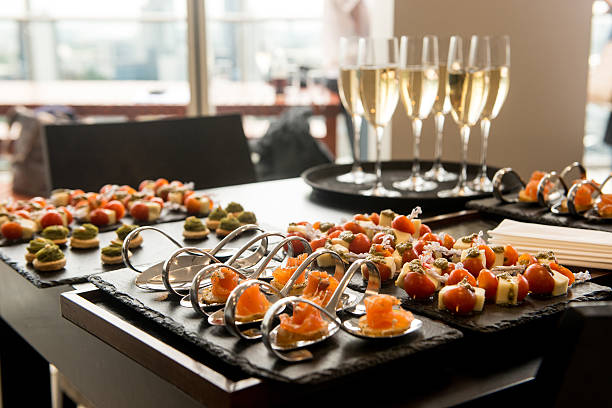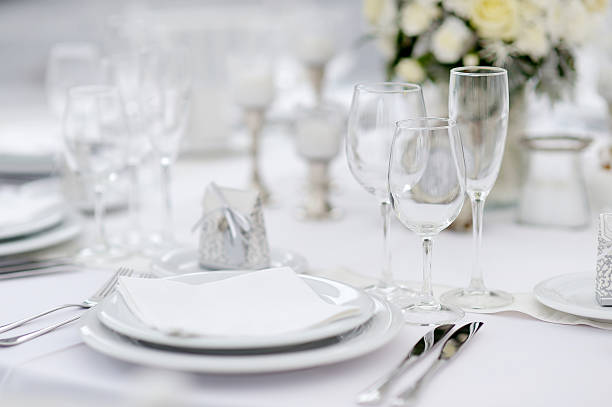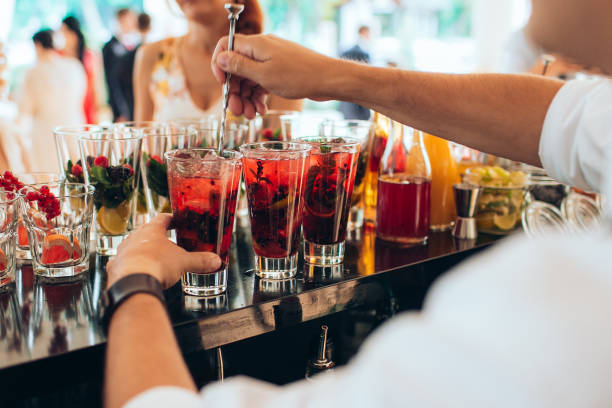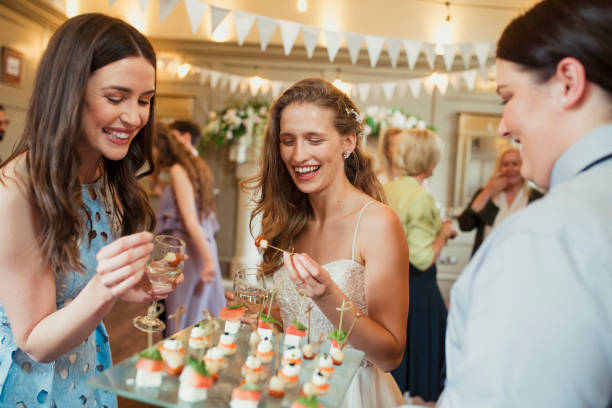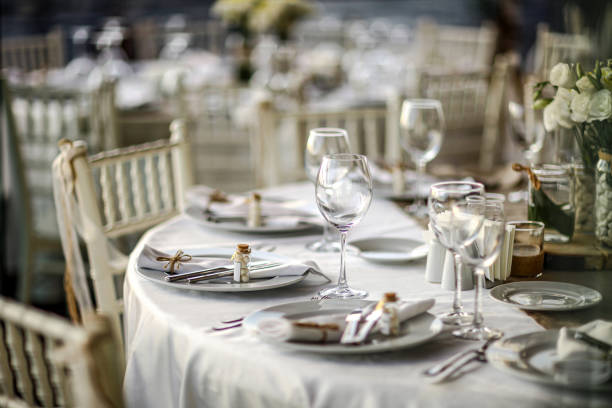
Selecting the perfect wedding caterer is a critical part of planning your big day. Food plays a central role in creating a memorable experience for your guests, so it’s essential to ensure everything is planned flawlessly. Asking the right questions can help you make an informed decision and avoid unexpected surprises. Below are some must-ask questions to guide your conversation with potential caterers.
Experience and Expertise
- How long have you been catering weddings?
- Have you catered events of a similar size and style before?
- Do you specialize in any specific types of cuisine or service styles (e.g., plated dinners, buffets, family-style)?
Understanding the caterer’s experience ensures they are well-equipped to handle your event’s unique requirements. For example, handling a large guest list or accommodating specific cultural traditions may require expertise not all providers possess.
Menu Customization
- Can we customize the menu to reflect our preferences and theme?
- Do you accommodate dietary restrictions such as vegetarian, vegan, gluten-free, or nut-free options?
- Are tastings included in the package? If so, how many dishes can we try prior to making our decision?
Tailoring the menu helps create a personalized experience for both you and your guests. A caterer that offers flexibility will make it easier to meet diverse culinary needs.
Services Included
Understanding what is included in their services can impact both cost and logistics:
– Do you provide tableware, glassware, linens, or additional decor?
– Will your team handle setup and cleanup during and after the event?
– How many staff members will be present on the wedding day?
A breakdown of what’s provided ensures there are no oversights when coordinating other rentals or vendors.
Logistics and Execution
It’s vital to know how smoothly things will run on the day:
– What is your process for serving meals: buffet-style, plated service, food stations?
– How long does setup typically take before guests arrive?
– What happens if there is an unforeseen issue (e.g., delays in meal service or staff shortages)?
This insight helps set expectations while allowing you to plan timings effectively.
Pricing Transparency
Nobody likes hidden fees. Be sure these questions are addressed upfront:
– Is gratuity included in your pricing structure?
– Are there additional fees for travel or extended hours of service?
– Can we get an itemized breakdown of costs?
| Service | Included | Optional Add-On |
| Tableware & Glassware | Yes | Upgraded options |
| Setup & Cleanup | Yes | Extended cleanup |
| Bar Service | No | Available at extra cost |
References and Reviews
Finally, ask about past client experiences:
– Can you provide testimonials or references from previous weddings you’ve catered?
– Are there photos available from similar events you’ve done?
This provides reassurance about their quality of work and reliability.
By covering these key areas with potential wedding caterers, you’ll feel confident knowing you’ve chosen a professional who aligns with your vision—and ensures every guest leaves satisfied with their dining experience.
Important Questions to Ask When Choosing Catering in Alexandria VA for Your Wedding
Selecting the right wedding caterer is one of the most important decisions you’ll make during your wedding planning process. Your caterer will play a key role in ensuring your guests have a memorable experience, so asking the right questions can help you avoid unnecessary stress and ensure everything runs smoothly. Below are some essential questions to guide your conversations with potential caterers.
Availability and Experience in Catering Alexandria
Before diving into menus and pricing, it’s important to confirm basic logistics:
– Are you available on my wedding date?
– How many weddings or events do you typically handle on the same day or weekend?
– Have you catered at my venue before? If not, are you familiar with its layout and facilities?
Understanding their availability and experience at your specific venue will give you peace of mind that they can work within the logistical constraints of your location.
Menu Customization Options with Alexandria VA Catering
You want a menu that reflects your personal taste as well as diverse guest preferences. Here’s what to ask:
– Do you offer customizable menus or options outside of standard packages?
– Can you accommodate specific dietary restrictions (e.g., vegan, gluten-free, nut-free)?
– Are local or seasonal ingredients used in your dishes, and can this be incorporated into the menu?
Caterers who are flexible with menu options will ensure that all guests feel included while aligning the food with your overall vision.
Service Styles Offered for Wedding Catering in Alexandria VA
Every couple has a different vision for how food should be served at their wedding. Ask about service styles such as:
– Plated dinners (formal table service)
– Buffet-style meals (self-service)
– Family-style service (shared dishes passed around tables)
– Food stations or cocktail receptions (perfect for less formal events).
Knowing what works best for your event’s flow will help narrow down the options.
Staffing Details for Caterers Alexandria VA
The team behind the scenes is just as important as the food itself. Key questions include:
– How many staff members will be assigned to my event?
– What roles will they cover (e.g., servers, bartenders, kitchen staff)?
– Will there be an on-site coordinator to oversee catering operations during the event?
A knowledgeable team ensures prompt service and quick troubleshooting if issues arise during the reception.
Tasting Sessions and Flexibility Offered by Catering Alexandria VA
Most reputable caterers offer tastings so couples can sample dishes beforehand. Be sure to ask:
– Do you provide tasting sessions before finalizing the contract? If yes, is there an additional cost?
– If changes are needed after tasting, how flexible are adjustments to flavors or presentation?
A tasting session allows you to fine-tune details while helping confirm that both taste and aesthetic meet expectations.
Sample Table for Catering Company Alexandria VA
| Category | Questions |
| Availability & Logistics | Are you available on my date? Have you worked at my venue before? |
| Menu Customization | Can we customize menus? Can dietary restrictions be accommodated? |
| Service Style | What serving styles do you offer (plated vs buffet vs stations)? |
| Staffing Details | How many staff members will attend my wedding, and what roles will they fulfill? |
| Tastings | Do tastings come with additional fees? Can we request changes after sampling dishes? |
Final Thoughts on Corporate Catering Alexandria VA
Choosing a wedding caterer doesn’t simply come down to their menu offerings—it involves understanding their services in detail, from staffing levels to flexibility in meeting specific needs. Asking these essential questions creates transparency between both parties while helping set clear expectations for what is promised on one of the most special days of your life.
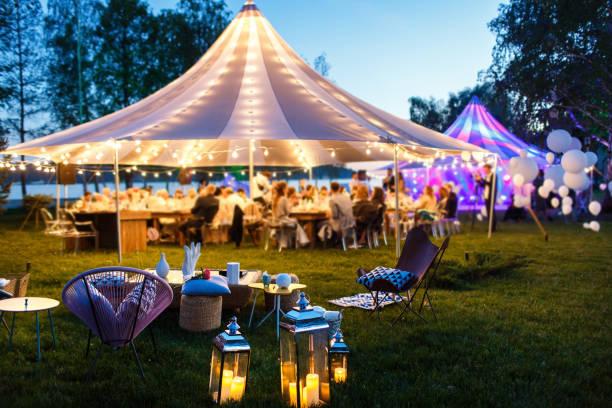
Not So Obvious Questions to Consider When Hiring a Wedding Catering Service
When hiring a wedding catering service, couples often focus on menus, pricing, and availability. However, there are several less obvious but equally important questions that can make all the difference in ensuring your wedding day runs smoothly. Considering these aspects will help you make an informed decision and avoid surprises.
1. Can You Cater to Late-Night Snacks or Post-Reception Meals?
Many weddings extend beyond the main meal into late-night celebrations. If your event will include an after-party or extended timeline, ask if the caterer can provide late-night snacks or small bites for guests who may get hungry again. Options like sliders, pizza bites, or dessert bars are popular choices.
2. What Is Your Food Waste Policy?
Sustainability is becoming increasingly important to couples planning their weddings. Inquire about the caterer’s food waste policies:
– Do they donate leftover food to local charities?
– Can leftovers be packaged for you or your guests?
– Are compostable materials used for food disposal?
Knowing this information demonstrates that your caterer aligns with environmentally conscious values.
3. How Do You Handle Last-Minute Changes?
Unexpected changes can occur in any event—guest counts might shift, dietary restrictions may come up last minute, or unforeseen weather could alter venue logistics. Ask how adaptable the catering team is under such circumstances: – Are there fees associated with last-minute adjustments?
– How much notice is required for changes to be accommodated?
This insight can provide peace of mind as you approach your big day.
4. Do You Offer Tastings Before Booking?
While many couples expect tastings from caterers already under contract, it’s worth asking if tastings are available before signing an agreement:
– Is there a fee for pre-contract tastings?
– Can specific menu items be requested during the tasting session?
This gives you an opportunity to evaluate their culinary expertise before committing.
5. What Is Included in Your Service Staff Provisions?
The quality and professionalism of catering staff significantly impact guest experience during meals and service times:
– How many servers per table will be provided? – Does staff setup include plating and clearing dishes? – Is gratuity automatically included in charges?
Understanding these details ensures no gaps in guest service expectations.
Sample Table of Key Comparison Points
| Question | Caterer A Answer | Caterer B Answer | Notes |
| Late-Night Snack Availability | Yes (Customizable) | Limited Options | Caterer A offers more options |
| Food Waste Policy | Donates Leftovers Locally | No Donation Program | A more sustainable choice |
| Last-Minute Change Flexibility | Accommodates w/ Fee | No Changes After Contract | Factor additional costs |
| Pre-Signature Tastings | Provided w/ Fee | Only After Booking | Consider pre-tasting benefits |
| Staff Included Per Table | 1 Server per 10 Guests | Flat Team Rate | Adjust based on guest count |
By diving into these lesser-known yet critical aspects of wedding catering services alongside more common considerations, couples can ensure they select a provider that matches both their logistical needs and personal values. This level of preparation helps minimize stress on the wedding day itself while creating a seamless dining experience for guests.
How to Customize Your Menu and Accommodate Dietary Restrictions for Your Wedding
Creating a wedding catering menu that reflects your unique tastes while accommodating the dietary needs of your guests is essential for a successful and inclusive celebration. With thoughtful planning and clear communication with your caterer, you can craft a menu that delights everyone. Here’s how to approach customization and manage dietary restrictions effectively.
Start with Your Vision
Before reaching out to caterers, outline the type of cuisine or theme you’d like for your wedding meal. Consider:
– The overall style of your wedding (formal, casual, or themed).
– Specific cuisines or dishes you and your partner love.
– Seasonal ingredients that could elevate the menu.
Discuss these ideas during your initial meeting with the caterer to see how they can bring your vision to life.
Incorporating Dietary Restrictions
- Collect Guest Information: Include a space on RSVPs for guests to indicate dietary needs (allergies, vegetarian/vegan preferences, gluten-free requirements, etc.).
- Prioritize Safety with Allergies: Ensure the caterer is aware of common allergens like nuts, shellfish, or dairy and has protocols in place to avoid cross-contamination.
- Offer Versatile Options: Include a variety of dishes so all guests have something they can enjoy without feeling excluded.
Customize Your Menu with Flexibility in Mind
- Appetizer Stations: Offer options like vegetable platters, hummus spreads, gluten-free crackers, and cheese boards so guests can mix and match based on their needs.
- Main Courses: Provide at least one vegetarian entrée alongside meat or seafood options.
- Buffets vs Plated Meals: Buffets allow more freedom for customization since guests can select what they prefer; however, plated meals lend themselves well to preselected menus accommodating known dietary restrictions.
| Course Type | Example Customization |
| Appetizers | Gluten-free bruschetta; vegan spring rolls; nut-free dips |
| Main Courses | Herb-crusted salmon (standard), stuffed portobello mushrooms (vegetarian), gluten-free pasta options |
| Desserts | Dairy-free sorbets; nut-free cakes; vegan chocolate mousse |
Collaborate on Tastings
Schedule tastings where you can sample dishes tailored to meet both taste preferences and dietary needs. Use this opportunity to give feedback and refine selections further.
Drinks & Beverages Considerations
Dietary restrictions extend beyond food—remember beverages too! Offer non-alcoholic alternatives alongside alcoholic drinks at bars or stations.
By collaborating closely with an experienced catering team while keeping inclusivity as priority number one throughout planning phases above ensures all attendees feel part memorable day-making meal enjoyable every guest seated table!
Understanding Pricing, Packages, and Payment Policies for Wedding Catering Services
When it comes to planning your wedding catering, understanding pricing structures, package options, and payment policies is essential for staying within your budget and avoiding unexpected costs. By having a clear grasp of these aspects, you’ll be better equipped to choose the right caterer for your special day. Below is a breakdown of what you need to know.
Key Components of Catering Costs
- Guest Count: Most catering services charge on a per-person basis. The more guests you have, the higher the overall cost.
- Style of Service: Options like plated dinners, buffet-style meals, or food stations impact pricing significantly. Plated meals usually require more staff and time than buffets, leading to higher costs.
- Menu Choices: Premium ingredients such as lobster or filet mignon will increase your bill compared to a simpler menu featuring chicken or pasta dishes.
- Beverage Services: Alcohol packages can vary from fully open bars to wine-and-beer-only options or even non-alcoholic service. This choice often makes a big difference in cost.
Examples of Common Package Inclusions
| Package Tier | What’s Included |
| Basic Package | Standard entrée options, basic sides, salad, coffee/tea station |
| Premium Package | Expanded entrée selection (e.g., seafood), premium sides and desserts |
| Luxury Package | Full customization with high-end ingredients; elegant presentation; hors d’oeuvres |
| Add-ons | Cake cutting service; late-night snacks; specialty drinks or cocktails |
Discuss with your caterer whether packages are customizable so they can tailor offerings for unique preferences or cultural requirements.
Payment Policies You Should Review
- Most caterers require an initial deposit at the time of booking. This typically ranges between 25%–50% of the total estimated cost.
- Request clarity about when remaining balances must be paid (e.g., monthly installments vs one lump sum closer to the event date).
- Understand cancellation terms—what happens if you cancel within certain timelines? Will deposits or partial payments be refunded? Confirm these in writing.
- Be aware of potential extra charges such as service fees, setup costs for tables/chairs/linens provided by caterers themselves rather than venue rentals.
Tips for Managing Your Budget
- Prioritize food quality over quantity—better fewer exceptional items than an overloaded spread with average tastes.
- Ask about hidden charges like cake serving fees (some venues charge per slice).
- Explore seasonal menus where seasonal produce works economically without sacrificing flavor profiles.
What to Expect from Your Wedding Caterer: Services, Setup, and Staff Details
When planning your wedding, choosing a catering service involves more than selecting a menu. You need to understand the full range of services your caterer will provide, how the setup will be managed on the big day, and what role their staff will play. Here’s a detailed overview of what to expect from your wedding caterer in these critical areas.
Core Services Provided by Wedding Caterers
- Menu Planning: Collaborating with you to design a menu that fits your tastes, dietary needs, and budget.
- Food Preparation: Preparing high-quality meals using fresh ingredients, often tailored to suit your event’s theme or preferences.
- Beverage Service: Providing drink options such as signature cocktails, wine pairings, or coffee stations.
- Tableware & Equipment Rentals: Supplying plates, glassware, utensils, and specialty equipment like chafing dishes or espresso machines.
- Bar Services (Optional): Staffing professional bartenders for alcohol service if applicable to your event.
- Cleanup Services: Ensuring post-event tidying is covered so you don’t have to worry about it afterward.
By clarifying these offerings in advance with potential vendors, you can avoid misunderstandings and ensure all aspects of meal service are accounted for.
How Caterers Handle Setup
- Table Arrangements: The catering team often coordinates with the venue or planner to set up tables with linens, tableware, and centerpieces before guests arrive.
- Buffet Station Setup (if applicable): For buffet-style receptions, caterers create aesthetically pleasing food stations with clear labels for dishes.
- Bar Placement: If beverages are being served, bars may be set up in designated areas with proper refrigeration or storage options available for drinks.
- Timing Coordination: Caterers work closely with event planners or coordinators to align food service timelines seamlessly with other reception activities such as speeches or entertainment.
Ensuring that everything is in place when guests arrive helps maintain an organized atmosphere throughout your celebration.
Staff Roles & Responsibilities
| Staff Role | Responsibilities | Average Ratio* |
| Servers | Deliver plated meals to guests; manage table requests (e.g., refills). | 1 per 10–12 seated guests |
| Bartenders | Mix and serve beverages; ensure proper alcohol handling if applicable. | 1 per 50–75 guests |
| Event Captain | Acts as the main point of contact between you/your planner and the catering team during the event. | Typically 1 per event |
| Kitchen Staff | Cook meals on-site if needed; handle any last-minute adjustments or replenishments for buffets. | Dependent on complexity of menu |
*Ratios will vary based on caterer policies and guest count expectations.
Discussing staffing levels beforehand ensures there will be sufficient support without unnecessary costs.
- Tips for Choosing the Perfect Wedding Catering in Alexandria VA for Your Celebration
- Essential Questions to Ask Before Hiring Alexandria Catering for Your Wedding
- How to Pick the Perfect Catering Alexandria Service for Your Wedding Day
- Planning the Perfect Event with the Best Catering in Alexandria VA
- 5 Important Factors to Consider When Choosing Catering Alexandria for Your Wedding
- A Complete Guide to Choosing Alexandria Catering for Your Wedding Day
- Essential Tips for Choosing the Perfect Catering Alexandria Service for Your Wedding Celebration

